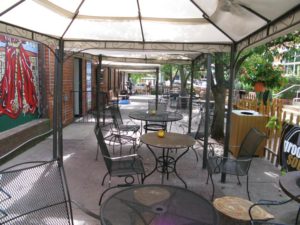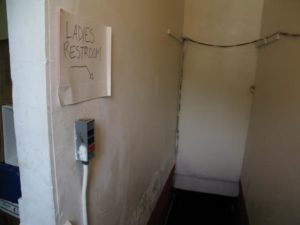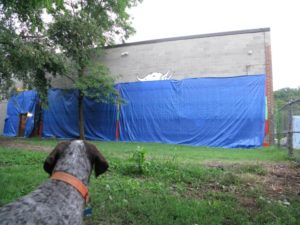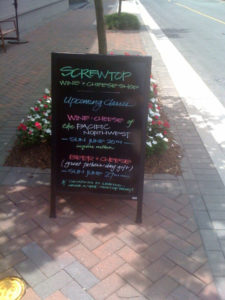 The sign police finally caught up with the notorious small business scofflaws of North Fillmore Street yesterday afternoon.
The sign police finally caught up with the notorious small business scofflaws of North Fillmore Street yesterday afternoon.
According to Screwtop Wine Bar owner Wendy Buckley, a county zoning employee “randomly” stopped by just before 4:00 p.m. and took her sandwichboard sign.
“This sign cost me over $175!” Buckley wrote in an email shortly after the incident. “I just got a call… telling me he threw it in a dumpster.”
Also gone: the sign for Bakeshop, the cupcake-and-coffee place down the block from Screwtop. See below for the county’s explanation of why the signs were removed.
“I’m a pretty positive and easy going person,” Buckley said. “But with today’s actions I am beginning to wonder what won’t this county do to hurt small businesses?”
Buckley quickly added that the county board has been “great” and are “the only people who ‘get it'” when it comes to the needs of small businesses.
In fact, during July’s three-hour board discussion of sidewalk seating on Fillmore Street, board member Chris Zimmerman emphatically encouraged his county colleagues to be more permissive with signs, especially sandwich board signs. Zimmerman and other board members spoke specifically about using signs to attract more foot traffic to the sleepy portion of North Fillmore Street where Screwtop and Bakeshop reside.
“Each of us on North Fillmore Street has a sandwich board sign to try and attract eyeballs down from Clarendon Boulevard,” Buckley said. “I am always happy to comply with any law, but our little businesses are doing everything we can to survive on this street. I don’t see how our signs, which are out of the way, can hurt anyone.”
Update at 2:15 p.m. — The head of the Arlington County Zoning Office has responded to our story.
Zoning Administrator Melinda Artman says sandwich board signs are prohibited throughout Arlington County. Despite supportive words for the signs at the July board meeting, Artman says board members must take legislative action in order to permit the signs to be placed on county property.
Screwtop was given three warnings about its sign, Artman says. The first was issued on June 10. The last was issued within the past couple weeks, and included a warning citation that the sign was “subject to immediate removal,” according to Artman.
It is a criminal misdemeanor offense to place a sign on public property in Arlington County. Violations are subject to fines up to $2,500. Screwtop has not been fined.
Artman says the county confiscates hundreds of signs per week, but tries to warn business owners first before removing them.
“Of course we support small business here in Arlington… but the feedback we receive from the community is that sign enforcement is very important to them,” she said.
When a sign is confiscated it’s thrown out, since the zoning office has no storage capacity.
Artman says many businesses, especially in the Ballston area, openly flout the county’s sign regulations. Sign enforcement has become a cat and mouse game; recently inspectors started conducting sign enforcement randomly rather than at set times, because businesses had gotten wise to the inspection schedules. The county now deploys six inspectors on sign enforcement details for three hours each week.
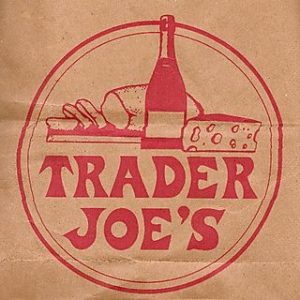 Arlington’s long-standing policy of encouraging grocery store development in the county is helping to pave the way for Trader Joe’s to open in Clarendon.
Arlington’s long-standing policy of encouraging grocery store development in the county is helping to pave the way for Trader Joe’s to open in Clarendon.


